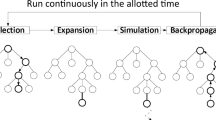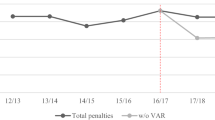Abstract
Is it possible for the organizers of a sports tournament to influence the identity of the final winner by manipulating the initial seeding of the tournament? Is it possible to ensure a specific good (i.e. king) player will win at least a certain number of rounds in the tournament? This paper investigates these questions both by means of a theoretical method and a practical approach. The theoretical method focuses on the attempt to identify sufficient conditions to ensure a king player will win at least a pre–defined number of rounds in the tournament. It seems that the tournament must adhere to very strict conditions to ensure the outcome, suggesting that this is a hard problem. The practical approach, on the other hand, uses the Monte Carlo method to demonstrate that these problems are solvable in realistic computational time. A comparison of the results lead to the realization that players with equivalent representation might relax the actual complexity of the problem, and enable manipulation of tournaments that can be controlled in reality.
Similar content being viewed by others
References
Aronshtam, L., Cohen, H., Shrot, T.: Tennis manipulation: Can we help serena williams win another tournament? Ann. Math. Artif. Intell. 80(2), 153–169 (2017)
Arrow, KJ., Sen, A., Suzumura, K.: Handbook of Social Choice and Welfare, vol. 2. Elsevier (2010)
Aziz, H., Gaspers, S., Mackenzie, S., Mattei, N., Stursberg, P., Walsh, T.: Fixing a balanced knockout tournament. In: AAAI, pp. 552–558 (2014)
Bartholdi, J.J., Tovey, C.A., Trick, M.A.: The computational difficulty of manipulating an election. Soc. Choice Welf. 6(3), 227–241 (1989)
Bartholdi, J.J, Tovey, C.A, Trick, M.A: The computational difficulty of manipulating an election. Soc. Choice Welf. 6(3), 227–241 (1989)
Bartholdi, Jo.J., Tovey, C.A., Trick, M.A.: How hard is it to control an election? Math. Comput. Model. 16(8–9), 27–40 (1992)
Betzler, N., Uhlmann, J.: Parameterized complexity of candidate control in elections and related digraph problems. Theor. Comput. Sci. 410(52), 5425–5442 (2009)
Binder, K., Heermann, D. W.: Monte Carlo Simulation in Statistical Physics. Springer (2002)
Chang, M.: Monte Carlo Simulation for the Pharmaceutical Industry CRC Biostatistics Series (2010)
Chaslot, G, Saito, J.t., Uiterwijk, J.W.H.M., Bouzy, B., Herik, H.J.: Monte-Carlo strategies for computer go
Chaslot, G.M.J-B., Winands, M.H.M., van den Herik, J.H., Uiterwijk, J.W.H.M., Bouzy, B.: Progressive strategies for monte-carlo tree search. Math. Nat. Comput. 4, 343–357 (2008)
Conitzer, V., Sandholm, T., Lang, J.: When are elections with few candidates hard to manipulate? J. ACM (JACM) 54(3), 14 (2007)
Erdélyi, G., Fellows, M.R., Rothe, J., Schend, L.: Control complexity in bucklin and fallback voting: An experimental analysis. J. Comput. Syst. Sci. 81(4), 661–670 (2015)
Hart, P.E., Nilsson, N.J., Raphael, B.: A formal basis for the heuristic determination of minimum cost paths. IEEE Trans. Syst. Sci. Cybern. SSC-4(2), 100–107 (1968)
Hazon, N., Dunne, P.E., Kraus, S, Wooldridge, M.: How to rig elections and competitions. Proc. COMSOC (2008)
Holte, R., Schaeffer, J., Felner, A.: Mechanical generation of admissible heuristics. Part I: Heuristics, 43 (2010)
Kim, M.P, Suksompong, W., Williams, V.V.: Who can win a single-elimination tournament? In: AAAI, pp 516–522 (2016)
Kim, M.P., Williams, V.V.: Fixing tournaments for kings, chokers, and more. In: IJCAI, pp. 561–567 (2015)
Korf, R.E.: Depth-first iterative-deepening: An optimal admissible tree search. Artif. Intell. 27, 97–109 (1985)
Lang, J., Pini, M.S., Rossi, F., Venable, K.B., Walsh, T.: Winner determination in sequential majority voting. In: IJCAI, vol. 7, pp. 1372–1377 (2007)
Lang, J., Pini, M.S., Rossi, F., Venable, K.B., Walsh, T.: Winner determination in sequential majority voting. In: IJCAI, vol. 7, pp. 1372–1377 (2007)
Mattei, N., Goldsmith, J., Klapper, A., Mundhenk, M.: On the complexity of bribery and manipulation in tournaments with uncertain information. J. Appl. Log. 13(4), 557–581 (2015)
Moulin, H., Brandt, F., Conitzer, V., Endriss, U., Lang, J., Procaccia, A.D.: Handbook of Computational Social Choice. Cambridge University Press (2016)
Pearl, J.: Heuristics: Intelligent Search Strategies for Computer Problem-Solving. Addison-Wesley, Reading (1985)
Russell, T., Van Beek, P: Detecting manipulation in cup and round robin sports competitions. In: 2012 IEEE 24th International Conference on Tools with Artificial Intelligence (ICTAI), vol. 1, pp. 285–290. IEEE (2012)
Russell, T., Walsh, T.: Manipulating tournaments in cup and round robin competitions. In: International Conference on Algorithmic DecisionTheory, pp. 26–37. Springer (2009)
Schadd, M.P.D., Winands, M.H.M., Van Den Herik, J.H., Aldewereld, H.: Addressing np-complete puzzles with monte-carlo methods. In: Proceedings of the AISB 2008 Symposium on Logic and the Simulation of Interaction and Reasoning, vol. 9 (2008)
Shrot, T., Aumann, Y., Kraus, S.: On agent types in coalition formation problems. In: Proceedings of the 9th International Conference on Autonomous Agents and Multiagent Systems, vol. 1, pp. 757–764. International Foundation for Autonomous Agents and Multiagent Systems (2010)
Stanton, I., Williams, V.V.: Manipulating stochastically generated single-elimination tournaments for nearly all players. In: WINE, pp. 326–337. Springer (2011)
Stanton, I., Williams, V.V.: Rigging tournament brackets for weaker players. In: IJCAI Proceedings-International Joint Conference on Artificial Intelligence, vol. 22, pp. 357 (2011)
Thuc, V u, Altman, Alon, Shoham, Yoav: On the Agenda Control Problem in Knockout Tournaments. Proc COMSOC (2008)
Vu, T., Altman, A., Shoham, Y.: On the complexity of schedule control problems for knockout tournaments. In: Proceedings of The 8th International Conference on Autonomous Agents and Multiagent Systems, vol. 1, pp. 225–232. International Foundation for Autonomous Agents and Multiagent Systems (2009)
Williams, V.V.: Fixing a tournament. In: AAAI (2010)
Author information
Authors and Affiliations
Corresponding author
Additional information
Publisher’s note
Springer Nature remains neutral with regard to jurisdictional claims in published maps and institutional affiliations.
Rights and permissions
About this article
Cite this article
Eidelstein, N., Aronshtam, L., Eidelstein, E. et al. Controlling sub-tournaments: easy or hard problem?. Ann Math Artif Intell 86, 257–268 (2019). https://doi.org/10.1007/s10472-019-09638-6
Published:
Issue Date:
DOI: https://doi.org/10.1007/s10472-019-09638-6




